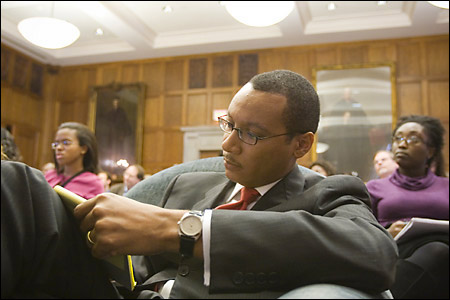A heady look at Hendrix and identity
A howling electric guitar echoed off the stately, wood-paneled walls of the Barker Center’s Thompson Room last week as London School of Economics (LSE) professor Paul Gilroy wrapped up the W.E.B. Du Bois Lectures with an exploration of African-American identity and culture as seen through the life and influential music of Jimi Hendrix.
In his tragically short life of 27 years, Hendrix’s blues-inspired heavy rock ‘n’ roll vision drove profound changes in popular music and the technology of making music just as African Americans were entering a period of evolving racial identity and an eroding relationship to their music, Gilroy said.
“The countercultural force of black popular music has ebbed as the market for black culture has expanded,” said Gilroy, the first holder of the LSE’s Anthony Giddens Professorship in Social Theory.
“Where has all that dignity, that respectable seriousness gone? We do, I think, need it now,” Gilroy continued. “How do the hopeful, open-minded insights of black songs like ‘Mighty Mighty’ come to sound so out of season?” In the 1960s hit song, Curtis Mayfield sang, “And mighty, mighty spade and whitey your black and white power is gonna be a crumbling tower.”

Gilroy, an internationally prominent thinker and writer on black culture and politics, last week packed the Thompson Room for three evening lectures called “On the Moral Economy of Blackness in the 21st Century.”
In his opening lecture, “Freedom Highway,” Gilroy took a critical look at the corrosive effect of American consumerism on black culture and life, driven in large part by the freedom of movement enabled by the automobile. Gilroy next examined the life of reggae great Bob Marley (whom, like Hendrix, he dubbed a “dissident innovator”) as the doorway to a discussion of globalization’s impact on black politics in his second lecture, titled “Could You Be Loved?”
Gilroy told his audience last Thursday (Oct. 5) during the “Bold as Love?” lecture on Hendrix that he grieves for what he called the lost “fragile and precious connection between black music and black politics, in which the former stretched and enriched the latter.”
That relationship was famously personified by Hendrix, who developed through adulthood from a volunteer soldier and supporter of the Vietnam War to one of the world’s highest-profile opponents of the war.
Gilroy fondly recalled feeling awestruck as a British teenager when Hendrix’s heavy hit “Purple Haze” burst onto London’s airwaves in 1967. He would come to see the man behind the wailing guitar, the man who put down an M-16 rifle to strap on a Fender Stratocaster, as “another person, like so many, that tried to be an African American and rather failed to pull off that trick.”
In response to a question from the audience, Gilroy elaborated on this suggestion, saying that Hendrix, in his view, failed to be an African American because he initially had to move to Europe to earn a living as a musician and because his characteristic mix of good-humored politeness and assertiveness didn’t conform to conventional notions of what it was to be black in America at the time.
Hendrix, Gilroy argued, achieved greatness by breaking rules musically and culturally.
“Jimi Hendrix playfully possessed the blues and amended its workings so they would be adequate to the technological and the moral challenges arising from the unsettled cultural environment of the decolonizing world,” he said, later adding, “He was always prepared, creatively, to damage superficially the musical traditions in which he had located himself.”
Gilroy left it to Hendrix himself to prove the point with his blazing, squealing version of the “Star Spangled Banner” recorded at the 1969 Woodstock Festival. Before playing the piece for the audience, Gilroy described the iconic electric guitar solo as “a systematically artful assault on the patriotic musical heart of the imperial nation in whose armed forces he had previously served with pride.”
The audience sat nearly motionless as Hendrix masterfully bent the familiar melody of the national anthem into psychedelic outbursts heavy with distortion and piercing feedback.
“Please forgive me for playing that through to the end,” Gilroy said as the last wail of Hendrix’s guitar faded to silence. “It’s just too important to know what train we’re on.”
The performance served as a kind of metaphor for Hendrix’s own musical and political transformation.
“We have to think of him as a paratrooper that became a hippie in an act of profound and complete treason that would make him an enemy of power until his death,” Gilroy said.
“His journey toward peace was all the more convincing,” Gilroy added, “because of the conversion’s gradualness, and because along the way he discovered the pleasures of jumping out of airborne war machines.”




